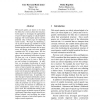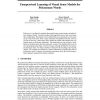52 search results - page 5 / 11 » Noun sense induction using web search results |
EMNLP
2008
15 years 1 months ago
2008
Web-search queries are known to be short, but little else is known about their structure. In this paper we investigate the applicability of part-of-speech tagging to typical Engli...
ESWS
2008
Springer
15 years 1 months ago
2008
Springer
Information on Web2.0, generated by users of web based services, is both difficult to organize and organic in nature. Content categorization and search in such situation offers cha...
102
click to vote
ACMSE
2010
ACM
14 years 9 months ago
2010
ACM
Most present day search engines have a deterministic behavior in the sense that they return the same search results for all users who submit the same query at a certain time. They...
ERCIMDL
1999
Springer
15 years 4 months ago
1999
Springer
I show that the World Wide Web is a small world, in the sense that sites are highly clustered yet the path length between them is small. I also demonstrate the advantages of a sear...
NIPS
2008
15 years 1 months ago
2008
Polysemy is a problem for methods that exploit image search engines to build object category models. Existing unsupervised approaches do not take word sense into consideration. We...


